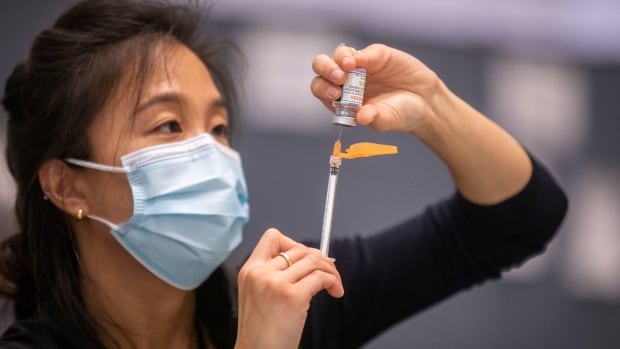The federal government succeeded in quickly securing and distributing COVID-19 vaccines and rolling out pandemic benefits to help people and backstop the economy, but wasted millions of doses and gave billions in benefits to ineligible recipients, the Auditor General of Canada says.
Karen Hogan’s fall audits, which were released Tuesday, give the government a mixed pandemic report card, saying that while benefit programs were swift and did what they were supposed to do, they were also wasteful and lacked proper verification.
“In 2020, the government decided to rely on information provided by applicants and limit pre-payment controls to expedite helping people and employers affected by the pandemic,” Hogan said in a statement. “In doing so, it recognized that there was a risk that some payments would go to ineligible recipients.”
The audit of benefits “found that overpayments of $4.6 billion were made to ineligible individuals, and we estimated that at least $27.4 billion of payments to individuals and employers should be investigated further,” she said.
Hogan’s audit of pandemic benefits warns that while $2.3 billion in overpayments had been recovered by this summer, the federal government may be running out of time to identify and recover the rest because of legislative time limits.
Legally, the federal government has 36 months from the time benefits are paid to verify the payment was proper, a time frame that can be extended to 72 months if the Canada Revenue Agency suspects recipients provided false information when applying for the benefits.
In its analysis, the Auditor General’s Office looked at:
- the Canada Worker Lockdown Benefit.
- Canada Recovery Benefit.
- Canada Recovery Sickness Benefit.
- Canada Recovery Caregiving Benefit.
- Canada Emergency Response Benefit (CERB), including the Employment Insurance Emergency Response Benefit and the Canada Emergency Wage Subsidy.
Achieving objectives
The audits not only looked at whether the payments were made to eligible recipients, and how well the government later verified if those payments were legitimate, but also how effective the pandemic supports were in achieving their stated goals.
“The Government of Canada set an objective of helping Canadians as quickly as possible. The COVID-19 emergency programs that we audited achieved that objective,” the audit said. “They quickly offered financial relief to individuals and employers, prevented a rise in poverty, mitigated income inequalities and helped the economy to recover from the effects of the pandemic.”
Canada’s gross domestic product took a 17 per cent hit between February and April 2020, shrinking the economy by some $350 billion. But by November 2021, the audit said, the economy was back to pre-pandemic strength.
The audit also said that without the pandemic supports offered to individuals and businesses, the poverty rate would have almost doubled during the pandemic, from 6.4 per cent to 11.6 per cent.
Although the government was successful in sending a sufficient number of doses to provinces and territories, the Public Health Agency of Canada ended up with a large surplus of doses.– Auditor General of Canada
Those pandemic supports, the audit said, primarily went to lower-income workers who benefited with an increase over their pre-pandemic incomes.
“Overall, these increases in government transfers to households exceeded losses in wages and salaries and self‑employment income,” the audit said. “This income compensation through the COVID‑19 programs helped to financially support the population.”
Despite achieving their stated goals, the Auditor General’s report says that the government’s efforts to verify and recover improper payments has “not been timely” and that “significant unrecoverable amounts are likely to materialize.”
“The CRA and Employment and Social Development Canada did not manage the selected COVID‑19 programs efficiently given the significant amount paid to ineligible recipients,” the audit said.
Procuring and distributing vaccines
When it came to the procurement and distribution of vaccines, the Auditor General gave the government a similarly mixed review, saying that while it did a good job sourcing supplies and striking procurement deals, the rush to acquire vaccines led to the waste of millions of doses.
“We found that, although a non-competitive approach was taken, Public Services and Procurement Canada exercised due diligence on the seven vaccine companies by conducting assessments to examine the companies’ financial capability to meet requirements and by conducting integrity checks to mitigate the risk of unethical business practices,” the audit said.
Hogan’s fall report said that the average cost of one dose of COVID-19 vaccine stood at about $30 and estimates that the total cost of the 169 million doses bought between December 2020 and May 2022 was about $5 billion.
“Although the government was successful in sending a sufficient number of doses to provinces and territories, the Public Health Agency of Canada ended up with a large surplus of doses,” the report said.
By May 31 of this year, the report said that Canada had 32.5 million doses, estimated to be worth about $1 billion, in inventories across the country, and another 50.6 million doses that were deemed surplus and were being offered up for donation.
Of those surplus doses, 15.3 million were donated, but another 13.6 million expired before they could be gifted to another country in need of vaccines.
“By the end of our audit period, the majority of these remaining doses still had a shelf life and could be used in booster campaigns or donated; however, most will expire by the end of 2022 if unused,” the audit said.


